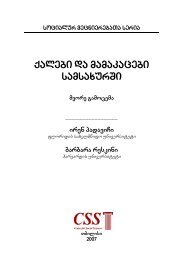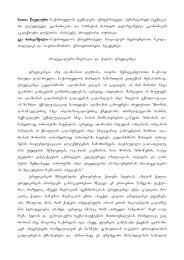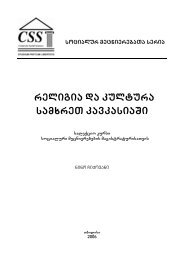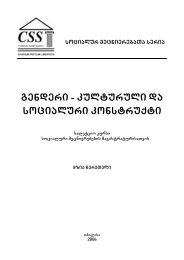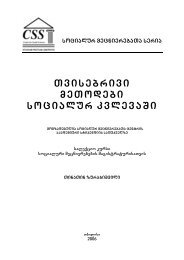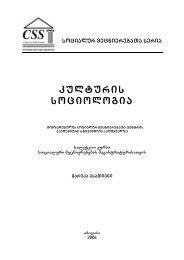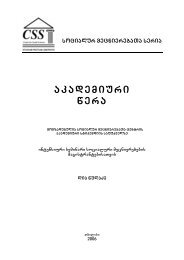kultura da modernizacia - Center for Social Sciences
kultura da modernizacia - Center for Social Sciences
kultura da modernizacia - Center for Social Sciences
You also want an ePaper? Increase the reach of your titles
YUMPU automatically turns print PDFs into web optimized ePapers that Google loves.
There<strong>for</strong>e, only culture itself is insufficient to deal with the global culture; financial support and<br />
material maintenance of this culture is also necessary.<br />
Due to the experience of his country, Katrin Lalumier the representative of France in European<br />
Parliament, states in the article “The War <strong>for</strong> Culture”: The process of globalization is followed by<br />
the stan<strong>da</strong>rdization of ideas and unification of the way of life by the American stan<strong>da</strong>rd.<br />
France has realized, that the French people have painfully felt the approach of the American<br />
culture. Nowa<strong>da</strong>ys, France is one of the countries, which rejects globalization, perceiving it as<br />
Americanization. France has turned back to the roots of own culture and has begun to advertise it<br />
on a large scale. Thus, France aims to save it’s original culture. We can conclude, that without<br />
economic maintenance, localization and preservation of own culture is impossible.<br />
It is interesting, that "facilitating circumstances" are offered to the societies by globalization;<br />
transnational corporations, international organizations and various funds, carrying out activities in<br />
the concrete country, usually offer several opportunities in this direction. To clarify this<br />
phenomenon, we can take example from the Georgian reality: the national Georgian <strong>da</strong>nce group<br />
“Erisioni” became popular all over the world after it was financed by the French organization; The<br />
purpose of the project was an offering something new to the world business, leading up to the<br />
profit. From the point of view of business, the joint project has appeared to be successful <strong>for</strong> both<br />
sides. Besides this, the Georgian <strong>da</strong>nces have achieved new success.<br />
As the answer to the challenges of globalization, Leopold Sengor’s (well-known African<br />
scientist), theory about the originality of the Negroid-African culture is quite interesting. He<br />
dreamed about synthesis of the Western conceptualism and African imagination. He dreamed of<br />
future Euro-Africa, which would become the predecessor of the world civilization, based on united<br />
culture of mankind. He considered that African civilization is an unique civilization. Leopold Sengor<br />
and his supporters concluded without organic synthesis with sensible, human African spirit, the<br />
Western civilization is doomed to failure. There have appeared concepts like “the African-<br />
European” and “European-African”. The African opposes to the European. The European is an<br />
engineer, pragmatist, who continuously exploits nature, himself and beings like him. Through all his<br />
life he works as a machine, counting money. He perceives world by means of <strong>for</strong>mula, i.e.<br />
consciousness. But the African is a poet; the nature is displayed and expressed by him. The<br />
attitude towards the nature is idealistic. There is a reign of collective soul, mutual aid and<br />
interconsistency; apart from Europe – where social antagonism, conflicts, aggression and<br />
discrimination of the man by the man are taking place.<br />
The Pakistan scientist Muhammad Tahir-Al-Qadri has offered his viewpoint in the article<br />
“Globalization of Culture?”. Al-Qadri is the supporter of cultural integration, thus he is the follower<br />
of the idea about universal values, namely: the stan<strong>da</strong>rds of success and achievement, activities<br />
and occupation, material com<strong>for</strong>t, practicality and efficiency, science and technology, freedom and<br />
individual choice, individual initiative and other elements. All these are sources to carry out a<br />
dialogue between cultures. According to Al-Qadri’s opinion, the cultural interaction is impossible<br />
without dialogue. It is necessary to integrate majority and minority, in order to conduct a dialogue,<br />
but special resources are required <strong>for</strong> this. In this case, the main responsibility is assigned to the<br />
majority. Al-Qadri is dissatisfied with West’s attitude towards Islam. The western society does not<br />
have the right image of Islam. It is familiar with Islam through contemporary viewpoints, created<br />
and provided by it’s own media sources.<br />
Al-Qadri declares, that <strong>for</strong> an explanation of cultural diversity and <strong>for</strong> real integration,<br />
ethnocentrism is incompatible. Ethnocentrism is a judgment about other culture by means of own<br />
stan<strong>da</strong>rds. Uni-culturalizm is also unable to solve this problem, as it trans<strong>for</strong>ms all ethnic cultures<br />
into one whole.<br />
It is necessary to search <strong>for</strong> the decision of this problem in three directions:<br />
116



